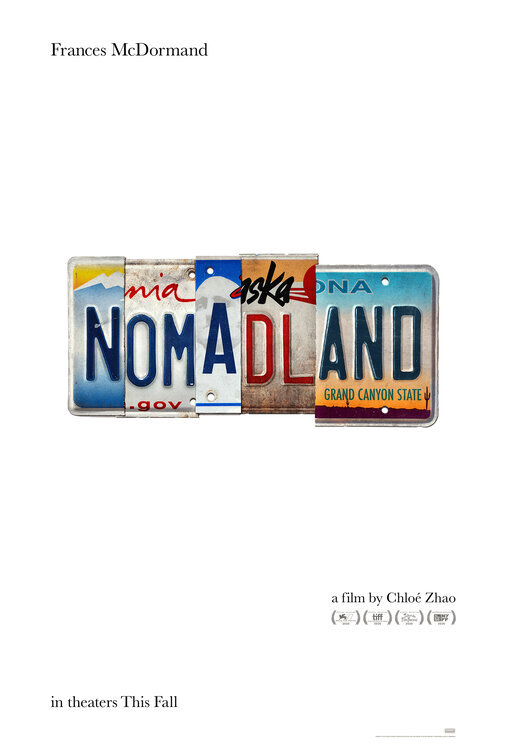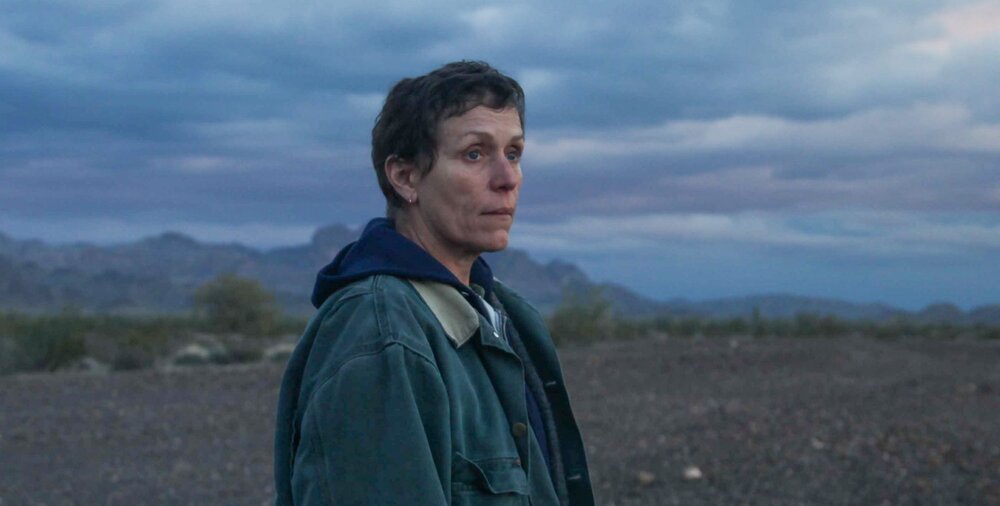Nomadland (2020)


SHOULD I SEE IT?
YES
Nomadland is a moving tribute to people who get ignored and marginalized every day. This is one of 2020’s best films.
Frances McDormand is as good as ever, but the writing and directing of Chloé Zhao should finally show the world the arrival of a major, formidable storyteller.
Tender, engaging, honest, and uncompromising, the syncopation between Zhao, cinematographer Joshua James Richards, and McDormand is simply beautiful to watch unfold.
NO
The movie has an intimate, quiet tone and timbre, which may feel underwhelming to people who turn to movies for something more bombastic and robust.
Some of you just aren’t going to be open to the message Nomadland is sharing with you.
I don’t have a third reason to avoid the film. This is an Oscar contender with near unanimous approval and Nomadland is a snapshot of an uncomfortable set of truths which we need to see, hear, and understand.
OUR REVIEW
There is beauty found within every frame of Chloé Zhao’s extraordinary Nomadland, the third feature from the accomplished and acclaimed writer/director. Sometimes the beauty is shown in a smile. Sometimes it is revealed in confession and vulnerability. In other moments, we find it in the gorgeous, breathtaking cinematography of Zhao’s collaborator, Joshua James Richards. These components, and more, make for a raw, real, and exceptional viewing experience.
Nomadland is one of 2020’s best films.
Frances McDormand, every bit as Oscar-worthy as she has ever been, portrays Fern, a woman living a nomadic existence after the recent economic recession, and calls her van her home. When an old friend encounters her at a store, she tells a daughter and former student of hers, “I’m not homeless, I’m houseless. There’s a difference.”
Fern built a life with her husband in the community of Empire, Nevada, which was supported through a gypsum mine which aided in the mass manufacturing of sheetrock. When the Great Recession hit in the late 2000s and early 2010s, the gypsum mine closed and essentially killed the town. Six months later, the town now abandoned, the State of Nevada terminated Empire’s zip code.
McDormand’s character serves as a composite of individuals found in Jessica Bruder’s book of the same name, which looked at how companies have turned to labor sourcing efforts, and the hiring of older Americans, to remain efficient in business and pay less wages, while keeping jobs in the United States. Fern, emblematic of a true nomad, takes seasonal or work in opportune moments – packing for Amazon in Nevada, harvesting beets in Nebraska, working in a restaurant in South Dakota, or cleaning California campgrounds, just to name a few.
A community of nomads absorbs her into the fold. Zhao, who wrote the screenplay based on Bruder’s book, holds these seemingly wayward souls in touching reverence. McDormand stars alongside non-professional actors and strikes an immediate kinship with friends like Linda (Linda May), who works with her at the campgrounds, and Swankie, a woman at peace with her life while managing a broken arm.
Zhao frames the first half of her film almost as a documentary. We sit around the campfire as Fern’s friends share observations, stories, and laughs. Conversations are authentic and real. Joy is found in the preservation of memories, baubles, and existence. And Richards frames these moments against a rolling landscape of the Far West, with a grounded, respectful, but roaming eye.

Nomadland reminds us that while it is impolite in some circles to acknowledge that we have “Two Americas,” the reality is we have multiple Americas for multiple individuals. Like great storytellers often do, Zhao gives us insight into a community that may initially seem to not exist within the fabric of American life (a group of individuals who come together and apart, living in vans and RVs) and makes them an integral part of the story of our country.
We settle in with these souls. We connect with their emotions. We feel as one with them. McDormand is as good as she has ever been; reactive and attentive for the film’s first half, before taking on more of a commanding presence in the second half, as she becomes friends with Dave (David Strathairn) and becomes more attuned to the decisions she has made for herself.
In lesser hands, it would be easy to shove the idea of Nomadland to the fringe of our thinking and turn up the heat in our 2,000 square foot homes, while grabbing a blanket and surfing the internet on our smartphones. Zhao embeds, embraces, and invites us to walk this journey.
And perhaps most affecting of all is how Zhao captures intimate, small moments which feel like everything. Floating on your back in a river, with not a soul around. Listening to a man share what he has learned in life after losing his 28-year-old son. The simplicity of seeing birds fly above you. The power of stepping into the memories of the past and letting them wash over you one more time, as you contemplate letting them go to better inform your future.
In the days since first watching it, I am struck by how much I am still thinking about the individuals Zhao brings before us and McDormand’s steely, yet vulnerable resolve. There is the nagging realization I cannot shake that we take for granted the ability to learn from one another and are so quick to dismiss those opportunities when they seem challenging or different than what we define as “normal.”
A powerful testament to the times we live in, Nomadland is a beautiful, unforgettable film, worthy of any and all praise, and a masterclass in storytelling by the inimitable Chloé Zhao.
CAST & CREW
Starring: Frances McDormand, David Strathairn, Linda May, Swankie, Cat Clifford.
Director: Chloé Zhao
Written by: Chloé Zhao
Release Date: December 4, 2020
Searchlight Pictures/Walt Disney Pictures
